Split 'Green Guerrilla' Planting Trees Illegally in Croatian Park Marjan
While most Split residents are asleep, members of the secret Split-based Green Guerilla direct action group covertly roam Marjan Forest Park with seedlings in hand, planting trees to help the city’s lungs breathe. They claim that everything they do is in collaboration with top forestry experts.
In addition to the Aleppo pine, they plant oak and cypress. However, they do not want to reveal how many trees they have planted so far and where, according to Ivana Perkovic/Dalmacija Danas on January 6, 2020.
The Split based group call themselves Green Guerrilla and their activities, although illegal, have met with widespread public approval. Nevertheless, some have wondered if these people might have better things they could be doing. Here's what they have to say:
To begin with: Split residents are interested in knowing; who are you and why did you organize?
We are a group of Marjan fans from Split who are tired of watching the destruction of life going on in the park. We have had enough of pillaging by the political elite, in which green spaces and trees in Marjan are being transformed into timber and are becoming prey to political calculation.
Some have wondered if you might have better things to do with your lives. Why did you begin planting right now?
For too long, those in charge have been saying that the afforestation process is set to begin. But they stand around with their hands in their pockets and prolong this process and pace it with campaigns for upcoming local elections. We’ve waited long enough, and it is a shame that the fate of Marjan is being decided by people who are calling the survival of vegetation into question. After a couple of years of delays, the forest has not been rehabilitated according to the agreed-upon method, and chopping down thousands of healthy trees cannot be called remediation. The real word that describes what has happened in Marjan is ‘criminal.’
Do you have experience in planting? What you say about statements by Damir Grubšić (JUPŠM/Public Institute for Marjan Forest Management) that you are doing more harm than good?
We are doing everything according to instructions from top forestry experts who wish to remain anonymous because they fear for their jobs. We would love to hear about what a shame it is to plant an oak, pine or cypress in the forest. If he is looking for pests in Marjan, he should first look at his current assistant and former director, Robert Koharević, and then at some other anomalies in the Public Institute. The real Marjan pests are those who illegally paved green areas and those who allowed them to are going unpunished while they remain in the city administration and Public Institute.
Are you afraid of being caught?
If one of us is caught, we will stand as one in solidarity and demand to be punished together. But we will also seek sanctions for those who have illegally harvested more than 20,000 Marjan trees, as determined by the State Forestry Inspectorate, and sanctions for those who have looked after Marjan in this manner.
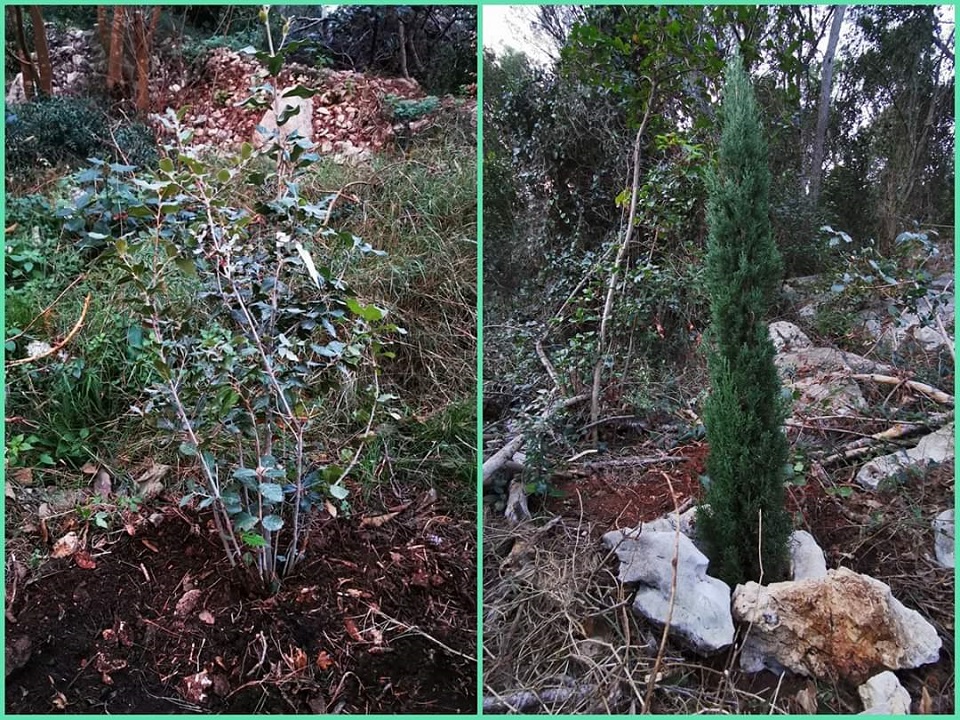
Green Guerrilla | Facebook
Are you planning to plant trees in large areas or just a symbolic number? How many trees have you planted so far?
That will remain our secret.
Will you respond to Mirko Rušić's invitation to plant trees when he officially begins the afforestation project?
We will not, because we do not want to work with a person who is unskilled, uneducated and unqualified to perform forestry work and, above all, a person who participated in the illegal felling of more than 20,000 Marjan trees.
We will only respond to an invitation to plant trees from an authorized forester. That person must stand up for afforestation, put his name behind it, and be responsible for all forestry efforts spanning the entire Marjan Forest Park protected area, which has already been slated for afforestation by the spatial plan and management program. Well, Marjan has been without a major forestry planning document for a year now. Should we be expecting an invite from someone who we can thank for putting Marjan in this situation?
You say that you are doing this "in defiance of those who would build and not plant on Marjan." Do you think that they are really trying to destroy the forest so that apartments and hotels will pop up on Marjan?
It’s not a matter of that we think. Parts of Marjan Forest Park have already been irreversibly destroyed by the unplanned and illegal construction of hotels and apartments, and now there are plans to build new cafes. Recent changes to spatial plans have been announced and who knows what else is happening in Kašuni, Kaštelet and Prva voda.
It has been officially confirmed that 75 buildings have been illegally built in this protected area, part of which is being used for apartments. There won’t be any peace while there are construction sites in the park forest, illegal construction continues, and the commercialization of Marjan is put ahead of its protection in the minds of those responsible.
How would you respond if someone started to harvest the trees you planted?
Trees cannot harm anyone, so destroying them would mean that they want war with well-meaning Split residents. If they want war with residents, they will have one, and a bigger tree will replace every tree that is removed. We will also make sure that the news of this behavior is spread beyond Croatia’s borders. This is at a critical time when the whole world is working on afforestation due to climate change, which has occurred due to the destruction of forests.
WHO IS PLANTING TWO TREES THIS EARLY
After the Aleppo pine, it was time to plant an indigenous oak and there was also a spot for a cypress. In view of yesterday's news story RTL Danas, we would like to address the statements of Mirko Rušić, President of the Marjan Commission, Deputy Coordinator of the Crisis Staff, and President of the Governing Board of JUPŠ Marjan:
Green Guerrilla documents several potential sites prior to planting, and then, in communication with forestry experts, selects planting sites for species proposed by the foresters themselves. Green Guerrilla, unlike the Marjan Commission and the Crisis Staff who have been left without professionals, has foresters who are happy to tell us what, where, how and when.
Increased patrols by the JUPŠ Marjan rangers are welcome. Perhaps they will now notice the illegal construction, pyromaniacs and other problems in Marjan, which have passed under their radar so far. The trees will continue to sprout either by our own hands or naturally, and no one can claim that any new tree is not part of a plan or program because we’ll remind them of the management program and afforestation plan.
It is a shameful for the team, held responsible by the State Forestry Inspectorate for devastating this forest, to deliberately delay the afforestation process as an election campaign nears. Greetings from the Green Guerrilla. While you p*** we will continue to plant. If you love Marjan get rid of the f****** construction sites in Marjan Forest Park rather than condemning and trying to find us.
Check out our Lifestyle page for more information on efforts (legal and illegal) to protect the environment in Croatia. Updates on Green Guerrilla's activites can be found here.
Croatian Zoran Milanović First Former Prime Minister Elected President
Although only 53 years old, Croatian President-elect Zoran Milanović is already a political veteran. Since Croatia's independence, he is the only politician to be elected to two of the most important state functions, first as prime minister and now president.
He was born on October 30, 1966 in Zagreb. In private conversations, he likes to point out that Zagreb shaped his identity, but was also intrigued by his family history, according to Robert Bajruš/Jutarnji List on January 6, 2020. Therefore, Milanović researched archives from Austrian barracks and the Sinj monastery in a quest for information on his ancestors and their life paths. Zoran Milanović's family is from western Bosnia and arrived in the Sinj region as part of a mass migration led by Franciscan Friars in 1687. His mother Đurđica Matasić's family has lived in Sinj for almost two centuries.
Father Held Key Zagreb Government Positions
His father, Stipe Milanović, performed several important roles during the socialist regime: he was Cabinet Secretary to Miko Tripalo, a Zagreb city council member and chaired the Vatroslav Lisinski Hall Construction Committee. In the early 1990s, he joined HDZ (Croatian Democratic Union) and became Assistant Minister to Vlatko Pavletić.
Milanović's claim that his grandfather was an Ustasha member (Croatian WWII Fascists) was one of the more interesting developments in the 2016 election campaign. He was referring to his mother Đurđica’s stepfather, Petar Plišić, but had kept silent about him until then.
He graduated from the Faculty of Law in Zagreb in the early 1990s where he was an excellent student. He received the Rector's Award and participated in the "Telders" competition in public international law at The Hague.
Began Post Law School Career in Foreign Diplomacy
Milanović landed his first job at the Commercial Court in Zagreb and then the Ministry of Foreign Affairs in 1993, where he arrived upon the recommendation of Ivan Šimonović, professor at the Faculty of Law and Permanent Representative of the Republic of Croatia to the UN. He became advisor to the Croatian Mission to the European Union and NATO in Brussels in 1996 and completed a postgraduate certificate in European Union law there two years later.
He joined SDP (Social Democratic Party of Croatia) immediately after his return to Zagreb in 1999. After SDP won the January 3, 2000 elections as part of a coalition, he was entrusted with a position in communications with NATO. Three years later, he was appointed Assistant Minister of Foreign Affairs under Tonino Picula. However, he left diplomacy and was brought onto the SDP Executive Board at the invitation of Ivica Račan after the HDZ won the 2003 elections.
Assumed SDP Leadership Role After Račan
The SDP party membership overwhelmingly chose Milanović as their new leader when Ivica Račan died in 2007. He had defeated Željko Antunović, Milan Bandić and Tonino Picula; the party’s old guard. While Račan had not considered him his successor; within a month Milanović had taken control of SDP and set about overthrowing Ivo Sanader.
Diana Pleština, widow of the former SDP leader, spoke about the Račan-Milanović relationship. While she has always thought well of Milanović; she also noted:
"Ivica Račan understood that Milanović was young and well-educated, and had experience communicating with the outside world, but he was not referring to Zoran Milanović in the phrase 'New SDP Force'. Instead he was referring to Milanović along with other members of the party. Therefore, the ‘New SDP force’ was not referring to one person, but an overall proposal to continue the rejuvenation of the Social Democratic Party, and one of those players was Milanović,” Dijana Pleština recalled.
However, he lost to Ivo Sanader in the 2007 parliamentary elections and spent the next four years leading the opposition. During that time, he was able to marginalize the old guard within SDP and surround himself with a new generation of associates including Ranko Ostojić, Siniša Hajdaš Dončić, Rajko Ostojić, Ante Kotromanović, Igor Dragovan and Gordan Maras.
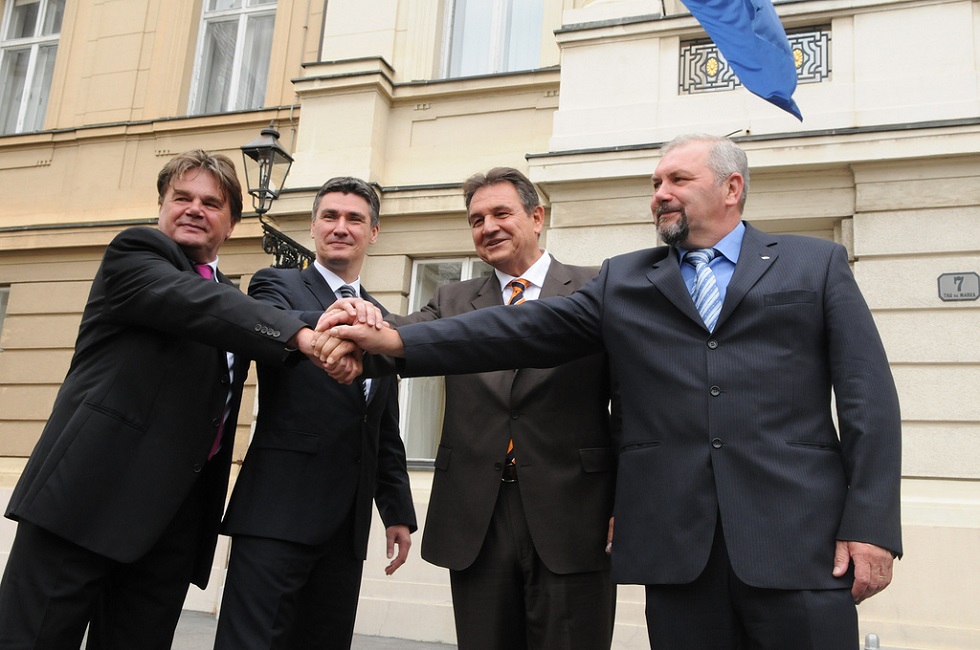
Defeated Scandal Ridden HDZ With Kukuriku Coalition
In November 2011, under Milanović’s leadership, the SDP-HNS-IDS-HSU coalition overwhelmingly defeated HDZ, which had been rocked by a series of corruption scandals. Their coalition ruled Croatia for the next four years. Before that victory, Milanović played a crucial role in the election of SDP presidential candidate Ivo Josipović. Josipović's victory had a strategic effect on the downfall of HDZ and Prime Minister Jadranka Kosor, and subsequent victory of the four-party coalition.
Milanović's political experience did not often reveal itself during his first three years in office. In the face of poor economic performance, he was subject to widespread criticism for refusing to make severe cuts to a bloated and inefficient state administration, which was stifling the economy. In addition, almost nobody believed he could make a comeback after he barely succeeded in expelling Slavko Linić from SDP in June 2014. Those doubts were strengthened after Kolinda Grabar-Kitarović narrowly defeated Ivo Josipović in the 2015 presidential election.
"Who would have thought that we were capable of regaining voter confidence back in January," Milanović recently suggested in a private interview.
Political Personal Evolution and Move to Right
Nevertheless, he changed tremendously and became much more accessible while choosing to remain silent about the confrontation with Linić. Even then, a well-known SDP politician revealed that he had been closely observing Milanović's career for seven years, and denied the widespread belief that the SDP chief was incapable of transforming himself:
"After losing the election to Ivo Sanader in 2007, Milanović realized that he had to change. He succeeded because he strengthened the party with new young talent. I’ve also changed and have begun displaying a better part of my character in interactions with people. That’s why I believe he can also change in a positive way,” claimed this member of government.
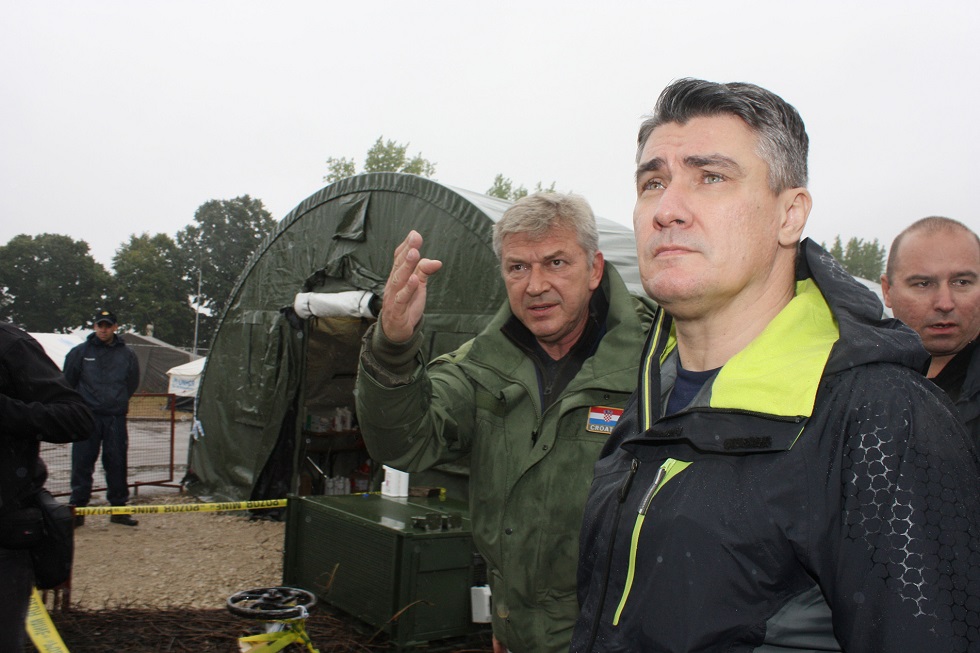
Praise for Franjo Tuđman and Croatian Nation in Knin
After all, Milanović's metamorphosis, which manifested itself in a slight turn to the right, was first noticed in Knin on August 5, 2014 when he gave a speech commemorating Dan domovinske zahvalnosti (Homeland Thanksgiving Day), which suggested a more patriotic direction. It was then that he first came forward with the conviction that his government was a people's government elected by the Croatian nation, comprised of people who are of primarily Croatian background. "As long is that is the case, we will oversee this country and lead it on the right path with Croatian interests in mind," Milanović said.
Milanović also paid respect to the first Croatian president, Franjo Tuđman, "because he was the Croatian president during a most difficult and challenging time."
“We have been waiting for a thousand years to have our own state and are grateful to those who gave everything for our country. For thousands of years we have worked, fought and died for foreigners, who treated us like foreigners, but they are not our enemies today. We are united with them in the EU and are building a better future together,” said Milanović in Knin.
It was the beginning of a 16-month campaign in which Zoran Milanović decided to tackle the stigma of (Croatian) leftists and present himself as a self-aware national leader. A social democrat who respects Tuđman, frequently mentions Croatia and condemns chauvinism then became his election-winning formula.
He also hired PR expert Alex Braun and his government achieved positive economic results in 2015. However, Milanović narrowly lost the parliamentary elections, remained at the helm of the SDP and defeated his old rival, Zlatko Komadin, in party elections.
Withdrawal from Politics After 2016 Defeat
After the fall of Prime Minister Tim Orešković’s short-lived administration in late 2016, Milanović led the People's Coalition into the elections, but lost, and then announced that he was withdrawing from politics.
In November 2016, he founded EuroAlba Advisory. Earlier this year, the media reported that the company's total 2018 revenue was 744,970 HRK (99,700 EUR), about a 20 percent increase from a 2017 reported revenue of 625,000 HRK (83,600 EUR).
Milanović lost his father Stipe and his younger brother Krešimir, who died after a short illness, during his election campaign late last year.
Follow our Politics page to stay updated on the new Croatian presidency and upcoming 2020 parliamentary elections.
Croatia Cup: Croatia Handball Tops Qatar, Wins Tournament in Porec
January. 5, 2019 - In the final match of the Croatia Cup 2020 on Sunday, the Croatia handball team defeated Qatar 33:28 and thus won the tournament in Porec.
HRT reports that Qatar beat Bosnia and Herzegovina 30:27 on Friday, and because Croatia played 33:33 against BiH on Saturday, this was a direct fight for first place.
Again, there were many ups and downs in Croatia’s game, but the victory was still great encouragement ahead of the start of the European Championship.
“We played a lot harder, more responsible, and it was definitely a better show and that is the path we should actually follow. In the first half, our defense was not very good, at 5-1, we received some easy goals, so the weaker part of the game was in the first half. We created chances in the attack but missed a lot of shots. There was a major change in the second half in the sense that our defense became much more solid. Fifteen minutes later, we found the key to the defense and that was decisive in this match,” said coach Lino Cervar after the match.
The best for Croatia was certainly Luka Cindric, who scored eight goals from nine shots. Luka Stepancic was also among the top scorers with five goals, while Frankis Marzo was the best for Qatar with eight goals.
“We expected a tough match, a fight, but on the other hand, they also have a Spanish coach, so they could also outsmart us tactically. However, I think that the coach saw what he could do better in these two games, what was good, what else we should work on and I am pleased that we won this Cup again and that we are going with that win to the Euros, so there will be a positive atmosphere,” said Luka Stepancic.
The European Championship is scheduled for January 9-26, and Croatia will play in Graz with Montenegro, Belarus and Serbia in the first round.
To read more about sport in Croatia, follow TCN’s dedicated page.
Croatia Presidential Election: Milanović Defeats Incumbent Grabar-Kitarović
According to final election results, released at 5:30am CET (Central European Time) on January 6, 2020; former Prime Minister Zoran Milanović has defeated incumbent Croatian President Kolinda Grabar-Kitarović and won his first five-year term as President of Croatia.
Here is a breakdown of the final election results with 100% votes processed (updated 5:30am CET):
52.67% - Zoran Milanović – Former Prime Minister | SDP
47.33% - Kolinda Grabar-Kitarović – Incumbent President | HDZ
Former Croatia Prime Minister Began Career as Diplomat
Zoran Milanović, born in 1966; was Prime Minister of Croatia from 2011 to 2016. He was also the leader of SDP (Social Democratic Party of Croatia), the largest center-left political party, from 2007 to 2016. He served as leader of the opposition twice, from 2007 to 2011 and for several months in 2016.
Milanović began his career in the Croatian Ministry of Foreign Affairs. He served as advisor at the Croatian Mission to the European Union and NATO and was assistant to the Foreign Minister of Croatia for political multilateral affairs.
Oversaw Croatia Entry Into EU in 2013
In June 2007, Milanović was elected President of SDP and formed a coalition uniting four center-left political parties, which won an absolute majority in the 2011 parliamentary election. He became Prime Minister later that year and oversaw Croatia’s entry into the EU in 2013.
His cabinet introduced changes to the tax code and began several large infrastructure projects. Milanović also supported the expansion of the rights of same-sex couples and introduced the Life Partnership Act.
Post-Political Career as International Consultant
He served as Prime Minister until 2015 and led the four-party coalition until early parliamentary elections in 2016. Milanović announced his withdrawal from politics following a surprise defeat. He began a career as a consultant and worked as advisor to Albanian Prime Minister Edi Rama.
In June 2019, Milanović announced his campaign for President of Croatia under the slogan “A President with Character.” He ran on a center-left platform, his record as prime minister and promised to be tough on corruption.
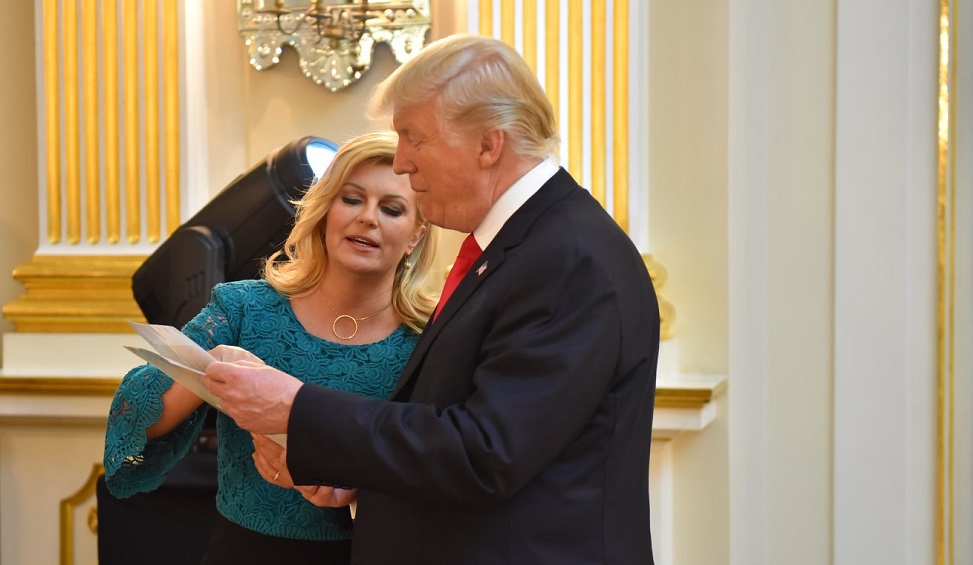
Kolinda Grabar-Kitarović and Donald Trump | Facebook
First Woman and Youngest Croatian President
Kolinda Grabar-Kitarović, born in 1968; has been the President of Croatia since 2015. She was the first woman and the youngest person to ever assume the office. In 2017, Forbes magazine listed Grabar-Kitarović as the world's 39th most powerful woman.
Before her election, Grabar-Kitarović held several governmental and diplomatic positions including Minister of European Affairs, Minister of Foreign Affairs and European Integration, Croatian ambassador to the United States, and NATO Assistant Secretary General for Public Diplomacy.
She was the only female candidate in the Croatian presidential elections held in December 2014 and January 2015 and was runner-up in the first round. She narrowly defeated incumbent President Ivo Josipović in the second round.
International Press Attention at 2018 World Cup
In 2018, Grabar-Kitarović received international press attention for attending the FIFA World Cup quarter-final and final matches, where she wore colors of the Croatian flag in support of the national team, who finished the tournament in second place.
Gaffes and Controversial Endorsements
Her presidential re-election campaign has weathered a series of gaffes and missteps. Last month, she claimed at a campaign rally in Osijek that she had secured jobs for Croatian citizens to work from home for 8000 EUR, after they had received training abroad. However, she later declined to provide details.
While she has positioned herself as a centrist, she welcomed endorsements from several controversial and far right-wing political figures. Marko Perković Thompson, a singer known for his use of WWII Croatian fascist symbols and language in performances, backed her re-election. And Grabar-Kitarović’s website featured a video message from Julienne Bušić, American-born author and activist, who hijacked a TWA flight in 1976 to promote Croatian independence. The party of Zagreb Mayor Milan Bandić, who is facing corruption charges, also endorsed her candidacy.
Former Prime Minister Maintained Solid Lead in First Round
According to exit polls in the first round of elections, held on December 22, 2019; Zoran Milanović maintained comfortable leads over Grabar-Kitarović and Miroslav Škoro, his two main opponents. Grabar-Kitarović was initially polling within one percentage point of Miroslav Škoro, which led to doubts about whether she would advance to the second round. According to final election results, Milanović received 29.55% of the vote and finished ahead of Grabar-Kitarović (26.65%) by nearly three percentage points. In turn, she eliminated Škoro (24.45%) from the run-off by a lead of just over two percentage points.
Grabar-Kitarović and Škoro, a popular folk musician, competed for support from center-right and far-right political parties and organizations, which led some analysts to believe that Škoro supporters would automatically shift their allegiance to the president in the run-off. However, pre-election polls had generated inconclusive results; with the President and former Prime Minister polling within a margin of error and leaving behind a large block of undecided voters. While Škoro confirmed that he would vote at the polls; he declined to endorse either candidate – and said that he would void his ballot.
Both candidates agreed to three debates, which were held on Monday, Thursday and Friday preceding the election. Mutual accusations of incompetence, impropriety and dishonesty dominated the discussions, which offered little on specific policy proposals.
Follow our Politics page for updates on this presidential election and upcoming 2020 parliament elections.
Croatia Presidential Election Silence: Live Updates Sunday as Polls Close
As of 12:00am Saturday January 4, 2020; the two-day electoral silence is in effect for Croatia. It will end at 7:00pm CET on Sunday, after polling stations close, and TCN will be providing live election updates.
Approximately 3,860,000 second-round voters will decide whether current Croatian President Kolinda Grabar-Kitarović (HDZ) or former Prime Minister President Zoran Milanović (SDP) will head the country for the next five years.
Widespread Electoral Silence Imposed by Croatia SEC
The so-called electoral silence is imposed by the SEC (State Electoral Commission) before any election campaign in Croatia, according to Index on January 3, 2020. On Saturday, the day before an election, and Sunday, election day; the publication of estimates, results and previous unofficial election results are prohibited. This ban also applies to photos, statements and interviews from the two presidential candidates.
The State Election Commission (SEC) urged candidates, their nominees, voters, the media and media publishers to respect the silence.
No Penalties for Violating Electoral Silence
"I urge participants and voters to respect the principles of the electoral silence. I also ask that candidates discontinue promoting themselves or their programs," cautioned SEC Vice President Vesna Fabijančić-Križanić.
“Whether or not the electoral silence is a desirable practice is debatable, but this is the law and it must be respected. We urge everyone abide by the law, even though there aren’t any penalties imposed for violating it," the SEC vice president emphasized.
The SEC reminds the campaigns not to post new posters or leaflets for the two candidates, call citizens, or send them SMS messages or e-mails asking them to vote in this second round of presidential elections.
Social Network and Media Included in Electoral Silence
Social networks are included in the electoral silence as well. Therefore, media and media publishers are expected to remove everything from their program content which represents electoral advertising: including official advertisements, links, image links-ads (banners) which lead to candidates' campaign websites.
At midnight, the deadline for Grabar-Kitarović and Milanović to collect donations also expired. According to reports, the HDZ candidate, received 2.3 million HRK (308,700 EUR) from donors as of December 27, 2019 while the SDP candidate collected 813,000 HRK (109,000 EUR).
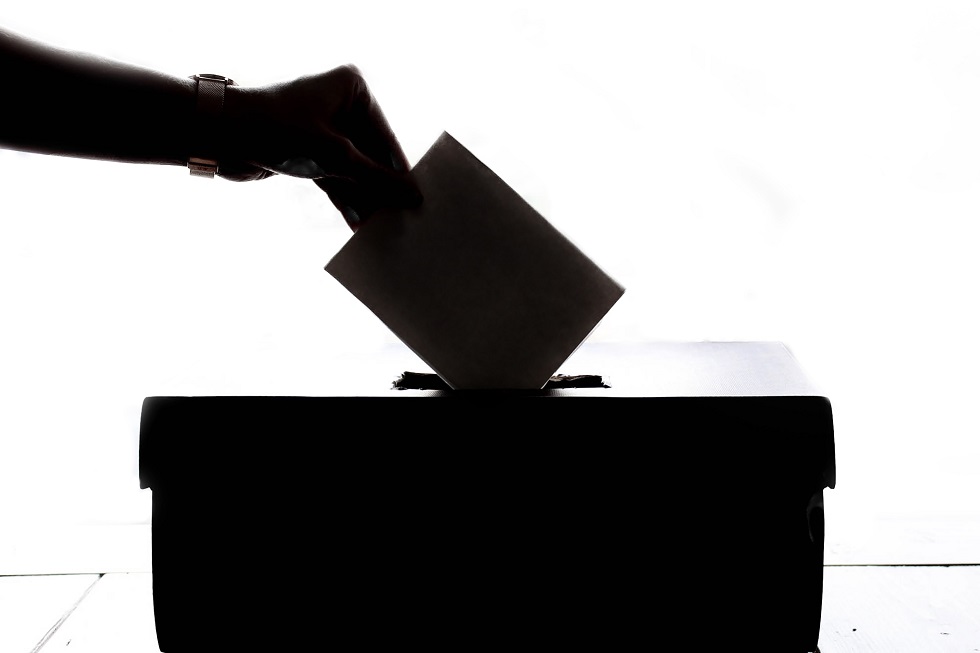
Element5 Digital | Unsplash
Polling Stations Will Open in 47 Countries
Elections for the Croatian president continued to a second round or runoff, because none of the 11 candidates received the required majority in the first election, which was held on Sunday December 22, 2019. The candidate who receives the highest number of votes in this round will win the election.
In addition to Croatia, presidential elections will be held in 47 other countries, with the first polling stations opening in Australia as early as Saturday night, Croatian time (CET).
Live Election Updates on TCN Starting 7:00pm CET
Follow our Politics page for live updates for the upcoming presidential election in Croatia, which takes place tomorrow Sunday January 5, 2020. We will be providing by-the-minute exit poll results and final election results after the polls close at 7:00pm Central European Time (CET).
Maslenica Bridge on A1 Motorway Closed 10 Cumulative Months Since 2008
According to data collected by Croatian Highways (HAC), the Maslenica Bridge on the A1 Motorway has been closed to traffic for 10 cumulative months since 2008. Residents of Dalmatia had believed for decades that their isolation would cease after the highway connecting them to continental Croatia was completed. They also welcomed the arrival of the Karlovac - Zadar - Split section of the A1 motorway route, including the "New" Maslenica Bridge, which officially opened on June 26, 2005.
But that good fortune only lasted until the first big storm, according to Jurica Gašpar/Morski on December 29, 2019. From then on, depending on wind speeds, the section spanning the Sveti Rok Tunnel to the Maslenica Bridge would regularly close to vehicles of all sizes in order to protect passengers.
Maslenica Bridge Closed to Traffic More Frequently
Nothing has changed since then except for the frequency of the motorway closures. For the last seven years this section has been closing even more frequently. So, 2019 will be remembered as the year it closed 68 times, which is the most it has ever been closed for traffic. By the end of this year, this section of the A1 had not seen traffic for more than 498 cumulative hours, or almost 21 days.
Courtesy of Croatian Highways (HAC), there is detailed bridge closure information from January 2008, the creation of the their database, to December 2019. During this time period, a total 575 traffic closures of the Sveti Rok - Maslenica section have been recorded, with a duration of almost 7126 cumulative hours or 297 days, which amounts to almost 10 months of traffic closures on this most delicate part of the A1 motorway.
Bora Closed Maslenica for 34 Cumulative Days in 2012
Regarding closures due to the Bora (extremely strong wind in Adriatic Coast), 2013 was the most peaceful year because the motorway closed only 29 times for almost 362 hours, or 15 cumulative days. And although the previous record for number of traffic closures the (60 in 2009) was not surpassed in 2012; the record was eclipsed for cumulative hours closed. Traffic was banned on this section spanning Sveti Rok Tunnel and Maslenica Bridge for 813 cumulative hours, or more than one month (almost 34 days).
See the table below for more details:
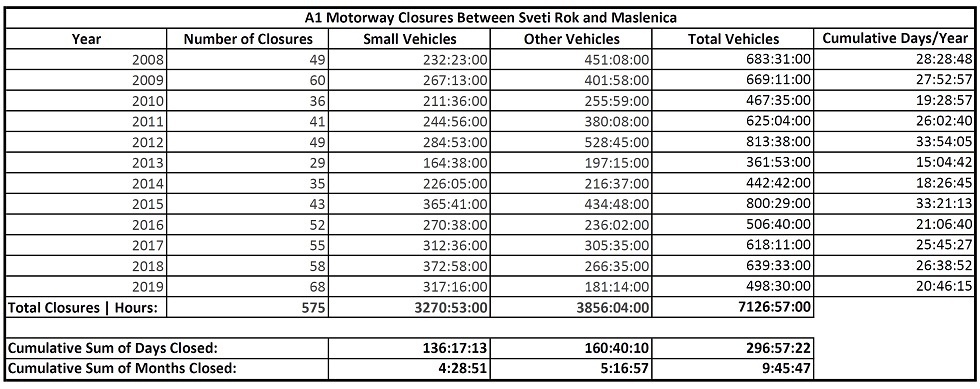
The Maslenica Bridge (called the "New Maslenica Bridge" to distinguish it from the "old" one, which was bombed during the Homeland War and rebuilt in 2004) has been subject to a great deal of public and media scrutiny because of frequent closures due to the storms.
Hurricane Force Winds Hit Bridge at Aggravating Angle
The highest Bora wind speed at Maslenica Bridge was recorded on December 21, 1998. At that time, wind gusts reached hurricane force levels of 248 km/h. Experts say the problem is that the wind does blow crossways, but at a 10-15 degree angle toward the bridge, which is an aggravating factor.
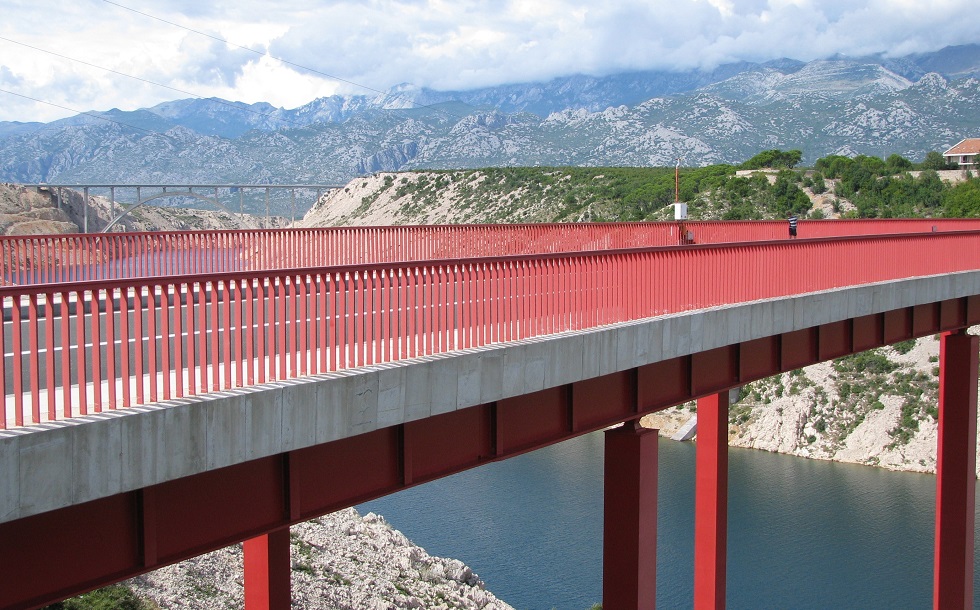
View of 'New' Maslenica Bridge from 'Old' Maslenica Bridge | Wikimedia Commons
Local Shepherds’ Advice Ignored for ‘New’ Bridge
Senior residents in the area recall that the builders of the "Old" Maslenica steel bridge on the D8 state road had inquired with locals about the best location. Shepherds reportedly responded by pointing out places where animals gathered and evacuated during the strongest winds. The first bridge was built on that site, and that turned out to be a successful choice because the Bora has hardly ever closed this bridge. The same cannot be said for the “new” bridge, of course.
Therefore, it’s no surprise that builders hadn’t taken any wind speed measurements for the area of the planned A1 motorway section spanning Sveti Rok – Maslenica before they began construction on the new bridge. Later measurements showed that this area between Marun and Crnava draga is the windiest – and that’s exactly where the highway was built. The average wind speed there is 32 kilometers per hour.
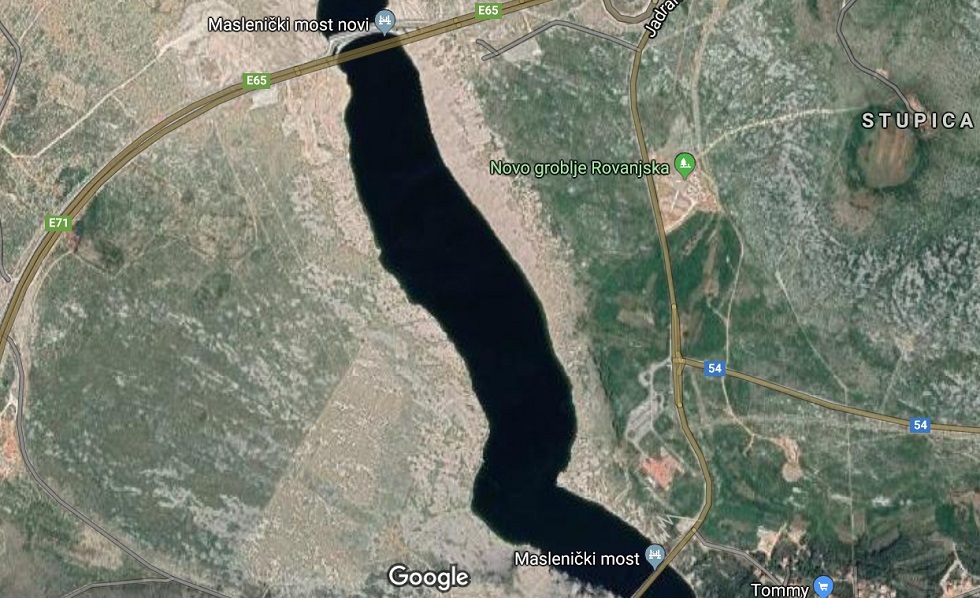
'Old' and 'New' Maslenica Bridges on Map
Most Expensive Motorway Section in Dalmatia
There is enough material to write a book about the politics, historical circumstances and (not) listening to locals and professionals regarding the planning and construction of this section, so those details will be left out of this text. Just the construction of the Sveti Rok Tunnel alone amounted to 1.5 billon HRK (20.1 million EUR), and billions were involved in building the connecting motorway over viaducts, overpasses and ultimately the Maslenica Bridge, which makes this section by far the most expensive motorway in Dalmatia. Therefore, each closure costs millions.
Suffice to say that Maslenica bridge closure has become more frequent issue and an adequate solution has not been found or implemented. But that's why Dalmatia has the most expensive toll road in Europe.
Follow our Travel page for more information, updates and upgrades on infrastructure in Croatia.
Croatia Presidential Debate: Hopefuls on Corruption, Taxes, Foreign Policy
On Thursday evening January 2, 2020; HRT (Croatia Radio Television) moderated the second of three debates between presidential candidates Croatian President Kolinda Grabar-Kitarović and former Prime Minister Zoran Milanović.
During the two-hour debate, the candidates answered 40 questions – which were divided into several groups including the economy and demographics, foreign policy and presidential powers, national security and the fight against corruption. Of course, there was a set of questions pertaining to worldviews and personal questions, as reported by Index on January 2, 2020. Here are a few highlights from last night’s debate:
Candidates’ Opening Statements:
Milanović: I am aware that I need to reach out to people who don’t intend to vote for me in the second round. I will defend the constitution and fight for the rights of all citizens. I will fight corruption, the monster which has consumed Croatia. The present government and president do not understand the difference between the public and private. Nor do they understand what it means to fight corruption. Those who break the law will not get any preferential treatment from me.
Kolinda: As a woman, I broke through the glass ceilings in the world. I was the first woman foreign minister, have important world connections and was one of the first presidents to meet Trump. I will move away from ideological issues.
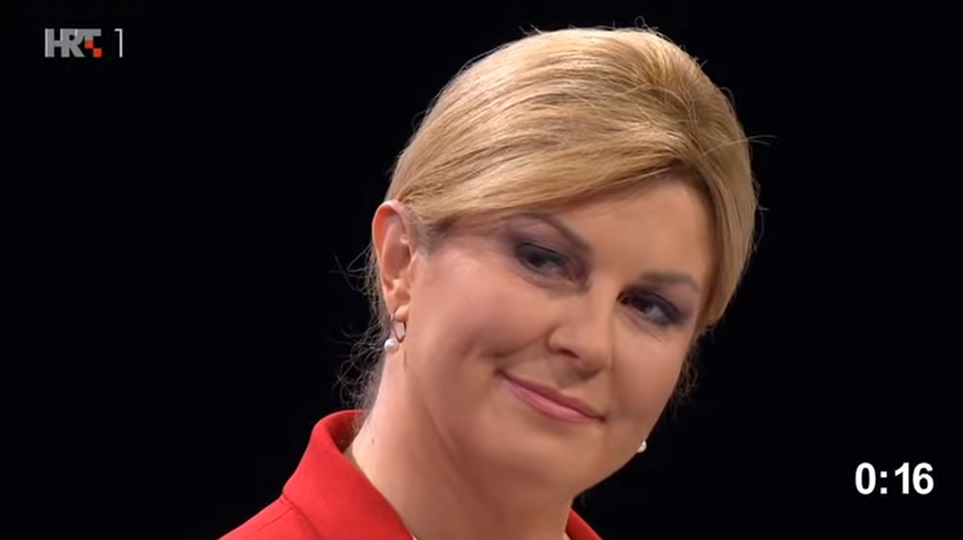
Entrepreneurs are complaining about high taxes. Are they too high?
Kolinda: The tax burden is too great. I do not want to please everyone, otherwise I would say what everyone wants to hear, and I am already too controversial. Zoran Milanović's government raised the VAT from 23 to 25 percent, which was a big blow. I am in favor of reducing taxes because that is the only way to secure higher salaries, create new jobs, investments and encourage people to stay. I will advocate for higher take-home wages and higher wages for employees.
Milanović: You are saying this to please everyone. Life is not like that, and it’s easy for someone who has never earned anything on their own. It is expensive to finance state obligations; including education and care for the elderly. Increasing the VAT rate during the recession was not a blow. Prices did not rise, so that thesis that does not hold water.
Kolinda: I’ve been working for a living since my third year of college. You addressed the deficit by increasing the VAT. I won’t allow you to downplay this failure because it was the VAT that impoverished our citizens. You had a budget deficit with a higher VAT. You can’t rely only on taxes to finance the state budget.
Milanović: How else would the budget be financed? From exports? This shows complete ignorance of fiscal policy.
How do we bring young people back to Croatia?
Milanović: The exodus began in 2016. Poland, Romania, Lithuania had the same problems after joining the EU. Did it destroy those states? As far as I know it did not. We are having moral panics in the Republic of Croatia. We are here, we will fight, we will survive, and they will return. I cannot blame either Milanović or Kolinda for the exodus.
Kolinda: The exodus began during the Milanović government due to pre-bankruptcy settlements and enforcement law. I'm not having a moral panic.
Milanović: Thousands of jobs were saved by pre-bankruptcy settlements, it's ridiculous to say that this is the reason for the exodus. Please don't embarrass yourself.
Kolinda: The fact is that pre-bankruptcy settlements benefitted your friends.
Who is Croatia's biggest ally?
Kolinda: It's the US and we are currently working on concrete proposals.
Milanović: Ms. Kitarović accomplished nothing when she was Croatian ambassador to the United States. You must be totally lost if you are claiming that the United States is our greatest ally. If the US is our closest ally; we are certainly not theirs. The current administration is what it is, and I don't want to fault them, but the EU is our biggest ally and the largest agent of peace in the world.
Kolinda: Of course, we are working with all EU countries. Let’s allow Milanović to highlight some of his achievements with Germany. Croatia is thinking about Croatia today, but is acting globally.
Milanović: I’m not out camping, I’ve worked, traveled, and hung out with the Scandinavian elite. Kolinda was an ambassador to the US and fled to NATO.
Kolinda: I've never turned my back on Croatia. Seventy percent of our foreign trade is with the EU. It is very important for us to work with Serbia and Bosnia and I want them to join the EU. But Milanović quarreled with all our neighbors. Where I build, you destroy.
Milanović: I'm glad to hear these phrases. Relations with neighbors have been the most corrupted by Kolinda. Now we only have a good relationship with Orban (Hungary). As for migrants (backed up at the border with Serbia in 2015); if we hadn't arranged for them to be transferred to Germany, those people would still be here with us now.
Kolinda: You caused that incident, you closed them off in Serbia.
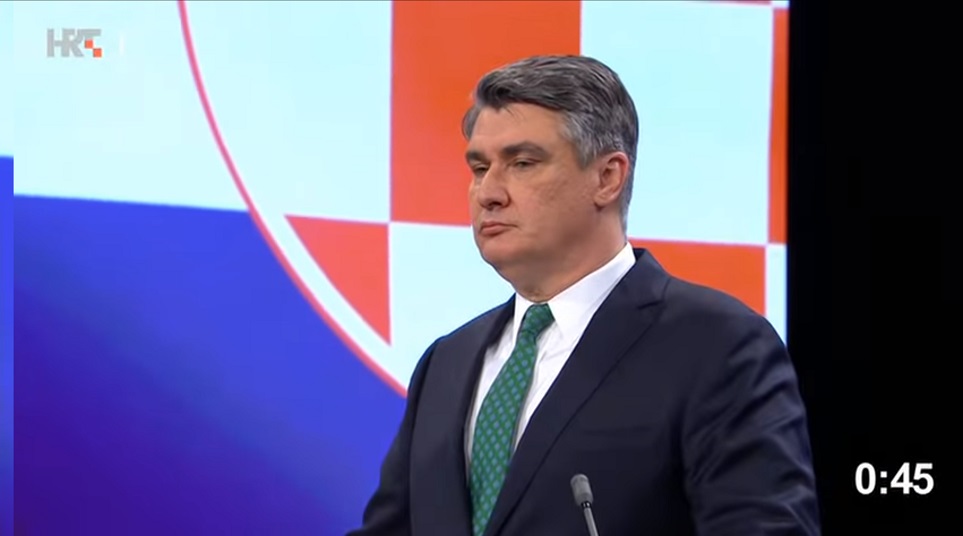
Do Jihadists in Bosnia pose a threat to Croatia?
Milanović: I believe SOA (Security and Intelligence Agency) is doing its job. Jihadists in Bosnia are a reality. Standard law enforcement measures will not help the situation there. Kolinda has damaged relations with a country with a Muslim majority due to her reckless stories.
Kolinda: I have don’t have any problems with Muslims. I didn't ruin the SOA; I don't interfere with their work.
Milanović: Kolinda hangs out with people who steal. I'm not saying she's stealing, but she's a serious problem for the system of national security.
How would you detect and prevent corruption?
Milanović: Saucha (former assistant to Milanović) has been indicted, and he now supports Kolinda and the HDZ. Kolinda arrived (to the debate) today from a celebration held by (Milan) Bandić - these messages are dangerous and toxic.
Kolinda: I did not come from a celebration. I was at an event held by a party which supports me comprised of individuals who support me.
Bandić has been indicted in several court cases. Why would offer to bring him cookies?
Kolinda: Bandić is innocent until proven guilty and I will fight for that. Let's not put people on a pillar of shame. Let's not forget Lovrić-Merzel (SDP), and you defended Bandić when he was your friend. Would you pardon Perković and Mustač (Yugoslav Secret Police)?
Milanović: I would not pardon anyone. You are talking to me about corruption. I have a letter here that you sent to the Washington Times praising Sanader before he fled justice.
Kolinda: I had no idea about Ivo Sanader's corruption. After all, he had dismissed me from the government.
Should the Croatian army withdraw from Afghanistan?
Milanović: Yes, immediately. It's been 16 years and it’s obvious that the Americans are not even clear on what to do there.
Kolinda: There has been one (Croatian) death since 2003. We will act as a responsible ally with NATO. My guess is that this process will begin sooner rather than later, and we will discuss it with our allies. Then, we will shift most of our forces to Eastern Europe.
Milanović: We are open to discussion, but we’ll make the decision. The soldier who died had his picture taken with me and asked me not to post the photo because he was still a specialist. A few days later, Kolinda posted a photo with that soldier. I would never manipulate people like that.
Kolinda: That’s false. The soldier waited for an hour at Ovčara to have his picture taken with me. He never asked me not to post that photo.
What do you think about the adoption of children by same-sex partners?
Kolinda: The adoption and foster care application process is very difficult in general, and we need to make it easier. Children need both a mother and father; I do not know if we are ready for the adoption of children by same-sex couples.
Milanović: That is a process which is unstoppable. We need to talk about it, accept it and understand that these trends are unstoppable. And there is a human element to this topic.
How much have your personal assets grown during your five-year term?
Kolinda: I don't know exactly. I’ve put everything in my asset statement. This year, I received a severance from NATO of around one hundred thousand euros. My husband and I live off our wages.
Milanović: That's nice when you get such a large severance pay. At the beginning of your term you had a loan of more than one million HRK. And that was paid off with what money?
Kolinda: I obtained a loan in 1995 with a 4.5 percent interest rate. I had to take out another loan in at a full (interest rate), but that loan was paid off in two years by selling some smaller apartments. How did you get the 180,000 EUR loan at a preferential interest rate?
Milanović: You are making things up again and everything you say is wrong again. This is public information. I was not the prime minister at the time. And, it was a loan for 300,000 EUR with a 6 percent interest rate. I paid back the first portion by selling our first apartment. Not only is this defamation, it is nonsense. At the time of Operation Storm, you got a loan with a 4 percent interest rate when everyone else’s loans were at 14 percent.
Kolinda: Yes, I got that loan as a Foreign Office employee. It was the minimal amount of credit, because I could not afford to borrow more. I paid it off. I’ve worked for all the money I have.
Milanović: That was credit available HDZ guys. You worked for that? It's unfair, dishonest and immoral…
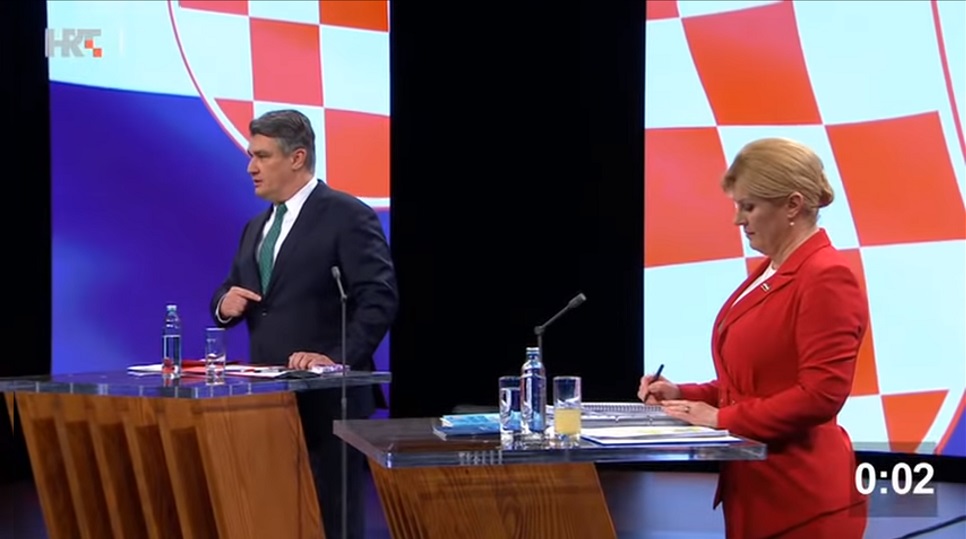
What did Kolinda mean when she talked about the coup?
Milanović: In 2015, Kitarović formed her government, after only 40 days of consultations with (Tomislav) Karamarko which went on behind my back. She was doing her best to undermine the center-left government.
Kolinda: In the first two years of my term, two rounds of parliamentary elections were held. I absolutely stand behind my claim that I maintained the stability of the state and did everything according to the constitution. There was a possibility of having a transitional government if one did not form within a reasonable time period.
The constitution provides for a 60-day window, so I consulted with constitutional lawyers and the Constitutional Court. I was told that this lengthy procedure would have to be completed because the Parliament would find themselves in constitutional crisis if their mandate expired. I never appointed any government and please don’t slander me. Find the evidence!
Milanović: Of course, you didn't leave any tracks, but people are talking. Sue them if they slander you. Personally, I will respect the constitution. And, (Vladimir) Šeks is a constitutional expert?
Kolinda: Šeks had nothing to do with it, and there weren’t any secret negotiations. You wanted a coup, so you barricaded yourself. Furthermore, you sent me a text message which read: “today you can be a stateswoman and appoint a government or you can give Karamarko control and be his puppet.”
Milanović: That’s defamation, I would never send that kind of message.
Closing Statements:
Milanović: In a few days you will elect a Croatian president. I am here to serve you, not to divide you, to fight against what antagonizes our people, for which they are losing the will to live and stay (in Croatia). Demographics are most successful if a country has fair leadership. For years, we have been led by people who are not fair leaders, but who have networked by formal and informal means. We have a president who hangs out with unworthy people, and a government which has fallen apart because of corruption. This is sending a terrible message. Nothing revolutionary will happen (if I become president), but we believe in making small shifts.
Grabar-Kitarović: When I took office five years ago, Croatia was on its knees because of the disastrous policies of Zoran Milanović, the worst Croatian Prime Minister in history. We have achieved growth which is not yet adequate. I want the GDP to be above five percent, and that positive factors impact your lives and financial obligations. We must stop young people from leaving and complete the process of education reform. We need to encourage entrepreneurship, create jobs, increase wages and pensions, and raise the standard of living. I am interested in our country, not party politics. I unite, rather than divide. My Croatia is a Croatia for everyone.
The presidential candidates will meet for one more debate before the election. Tonight (Friday January 3, 2020) at 20:20h, they will face off on Nova TV.
Follow our Politics page for news on the upcoming presidential election in Croatia, which will take place on Sunday January 5, 2020. We will be providing by-the-minute exit poll results and final election results after the polls close at 19h Central European Time (CET).
Croatia Hotel Renovation Project Abandoned in Downtown Pula
A well-known Croatian entrepreneur has abandoned his plans to transform a historical building in Pula, Croatia into a hotel and lost his 785,000 HRK (105,000 EUR) deposit after he was informed by government officials of unexpected additional costs.
Another Failed Croatia Real Estate Venture
Another real estate venture has failed in Croatia, this time in the historical center of Pula according to Barbara Ban/Novac/Jutarnji List on December 31, 2019. This project involved the renovation of Scracin building, which formerly housed the Croatian Pension Insurance Office (HZMO) and Croatian Health Insurance Office (HZZO). The building is located next to the Zlatna vrata (Golden Gate) or Slavoluk Sergijevaca (Arch of Sergius) landmark.
The buyer, renowned Istrian entrepreneur Kristijan Floričić, allegedly abandoned the purchase of the building priced at 15.7 million HRK (2.1 million EUR) and lost a sizeable deposit of 785,000 HRK (105,000 EUR) after he realized that, due to the number of unanticipated conservation projects and required research, he would not be able accomplish everything he had planned, which was to transform the property into a hotel. In December, TCN covered another much larger failed real estate venture, which was abandoned by investors for eerily similar reasons, on the island of Pašman. Back in Pula, the Scracin building is on the market again as of December 11, under the exact same conditions and for the exact same price.
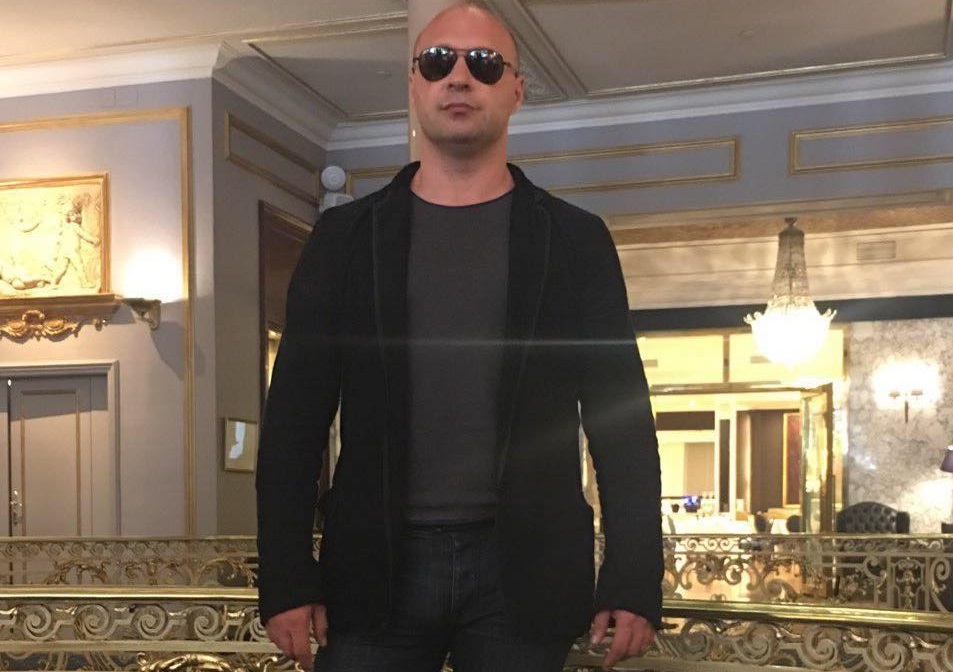
Kristijan Floričić | Facebook
Buyer Informed of Costs and Restrictions After Deposit
Unofficially, problems arose after Floričić submitted his offer, and he found out that he would have to invest a considerable amount of money in research before he could move forward with his renovation plans. The conservators would not allow specific renovations to the building and the conditions they set for the buyer allegedly amounted to a multi-million HRK investment, which is why Floričić decided in the end that the project would be unprofitable. What kind of research was necessary and whether that research required a multi-million HRK investment could not be confirmed because the Pula Conservation Department could not be reached for comment. But this building, built between 1880 and 1881, and destroyed in a 2014 fire, will unfortunately remain vacant until further notice.
The building owners are claiming that Floričić knew what kind of property he was buying because the tender noted that the building was a cultural asset.
Building Registered as Protected Cultural Property
“According to the provisions of the Law on Protection and Preservation of Cultural Property, before the procedure of sale by public tender, the real estate was offered to the Republic of Croatia (Ministry of State Property), the County of Istria and the City of Pula. These authorities showed no interest in the purchase, and on October 10, 2018; a public tender for the real estate sale was published in Narodne novine, Glas Istre, and on the HZZO and HZMO websites.”
“The tender stated that the so-called Scracin Palace is a property of a cultural value and had been entered in the Register of Cultural Properties of the Republic of Croatia and the List of Protected Cultural Properties. Each potential bidder had the opportunity to inspect the real estate, as well as access to the Register of Cultural Properties of the Republic of Croatia. The buyer also had the opportunity to inform the ministry of their potential plans related to the renovation of a cultural property,” the Croatian Health Insurance Office pointed out.
They added that the bidder had fulfilled all the conditions of the tender and his bid had been selected as the most favorable one, but he eventually decided that he did not want to finalize the purchase contract.
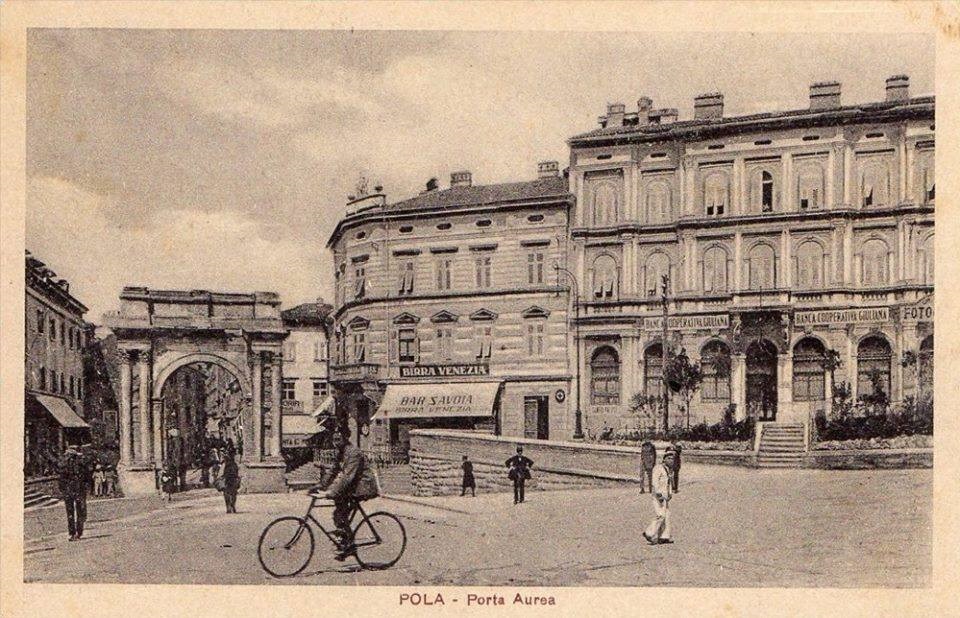
Zlatna vrata and Scracin Building | Vintage Postcard | Facebook
Buyer Abandoned Purchase and Lost 105,000 EUR Deposit
“After the conditions for the finalization of the real estate purchase contract were fulfilled (the prior consent of the Governing Council of the co-owners and the Government of the Republic of Croatia), the selected bidder-buyer was invited to finalize the purchase contract. However, the buyer abandoned the finalization of the purchase contract because, according to him, the real estate has certain material defects which make it impossible to use for the specified purpose, which was the completion his planned project. Since the co-owners of the real estate do not believe that the material defects were not known to the bidder at the time of submitting the bid, the selected bidder has lost the right to recover the deposit,” according to a statement from Croatian Health Insurance Office.
They add that it was stated in the conditions of the public tender that the successful tender applicant was obliged to finalize a purchase contract with the sellers of the real estate within 30 day from the invitation to finalize the purchase contract. Otherwise he would forfeit his deposit.
Building Back on the Market: Same Price and Conditions
The building is now on sale again for the price of 15.7 million HRK (2.1 million EUR) as it was previously and is available to view as of January 14. Bidders are required to pay a five percent deposit of the initial price of the property, or 785,000 HRK (105,000 EUR). The deadline for bid submissions is January 17, and bids will open to the public on January 23. The building itself is about one thousand square meters, with an additional 576 square meter building and a 15 square meter auxiliary building. They state that the property is for sale in its current state, which is "as-is".
Follow our Business page to keep track of failed (and successful) business ventures in Croatia.
Croatian Railways Building 400 Kilometers of High Speed Track
Croatian Railways is building 400 kilometers of high-speed track and trains on several key routes will be running at speeds of up to 160 km/h within 10 years. The average speed of a current Croatian train is only 58.2 km/h! Only Serbia, Bosnia and Montenegro have railway systems worse than ours.
However, December has proven to be the month of railways when it comes to major projects in this area of Croatian infrastructure, according to Krešimir Žabec/Jutarnji List on December 30, 2019. For years, there have been reports of billions of euros coming to Croatia to upgrade our catastrophic rail network.
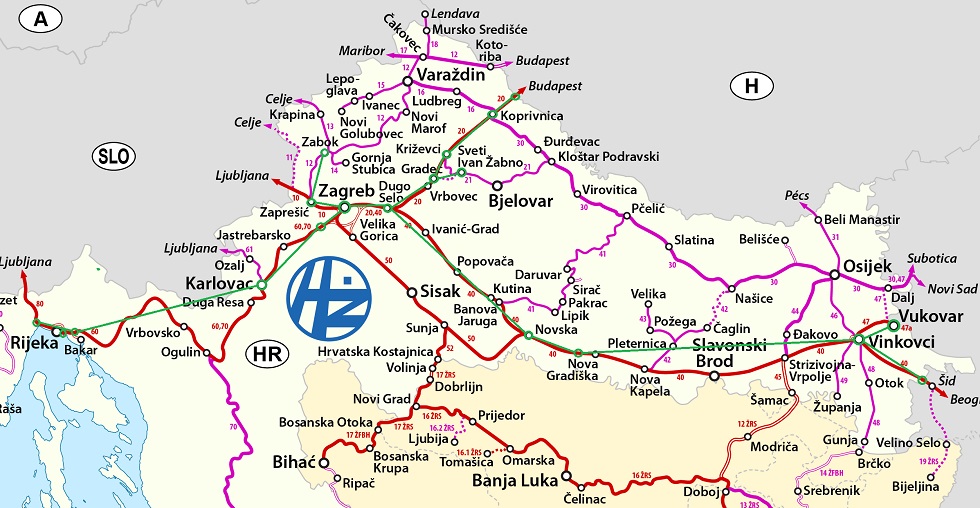
Map of Current and Upcoming Croatian Railways High-Speed Projects | Croatian Railways
Average Speed of Current Croatian Train: 58.2 km/h
The state of railway infrastructure in Croatia is perhaps best illustrated by the indicator of 58.2 kilometers per hour, which is the average speed of trains running in Croatia. Only Serbia, Bosnia and Montenegro have railway systems worse than ours. But until recently, promises of a brighter future for Croatian Railways have sounded like the dreams of politicians which never produced any visible results. However, a turnaround began to take hold this past month.
First New Railway Line in 50 Years Launched in December 2019
First, after 50 years, a new railway line was launched in Croatia: from Gradec to Sveti Ivan Žabno. Then, in Vukovar, a contract was signed with the Spanish company Comsa to upgrade and electrify the Vinkovci - Vukovar railway. Eight years after its launch; the Turkish company Cengiz was selected as contractor for the Križevci - Koprivnica - Hungarian Border section of the project. And a 321 million EUR contract was finally signed to build the Lowland Railway section of Hrvatski Leskovac to Karlovac, which is being co-financed by the European Union.
Three Billion EUR Investment in Croatian Railways
Croatia, the European Union and the World Bank are expected to invest more than 3 billion EUR in designing, renovating and upgrading Croatian railway infrastructure over the next ten years. There are 18 projects in different stages of progress, of which only the Gradec - Sv. Ivan Žabno line has been finished.
Overview of the 250-Kilometer Lowland Railway Project
The international Mediterranean railway corridor connects Rijeka with the Baltic. The Croatian part of this corridor is divided into a section from Zagreb to Rijeka, known as the Lowland Railway, and the section from Zagreb to Botovo (the Hungarian border). It is a 250-kilometer railway line, and only 22 kilometers, from Zagreb to Dugo Selo, are currently two-lane and have been electrified. The estimated value of the modernization and construction of this route is approximately 2.6 billion EUR, and that tab does not include the cost of modernizing the Zagreb hub.
The other sections of this route are in different stages of completion. Work on the 38.2-kilometer Dugo Selo – Križevci section is underway and running about two years behind schedule.
The contract for co-financing and a tender for a contractor have been signed for the section from Hrvatski Leskovac to Karlovac.
Two Options for Most Expensive Lowland Span: Karlovac - Škrljevo
The Hrvatski Leskovac – Karlovac section is connected to the most difficult and expensive span, running from Karlovac to Škrljevo, which is about 150 kilometers long. Construction costs could reach 1.5 billion EUR, but he total cost of will depend on whether the Northern or Southern option is selected. Kupska, the Northern option, is 150 kilometers long, of which 61 kilometers involve tunnels and bridges. Drežnička, the Southern option, is 170 kilometers long with 45 kilometers of tunnels and bridges.
It is unknown at this time whether this section will be put into concession or the European Commission will decide to co-finance the project, due to concern over utilizing Chinese capital. EU funding for Croatia is a more favorable option as it won’t impact public debt. In the event of a concession, a Chinese company would build and finance the project, backed by state guarantees of around 1.5 billion EUR. And it would be difficult for the Croatian state to allow that.
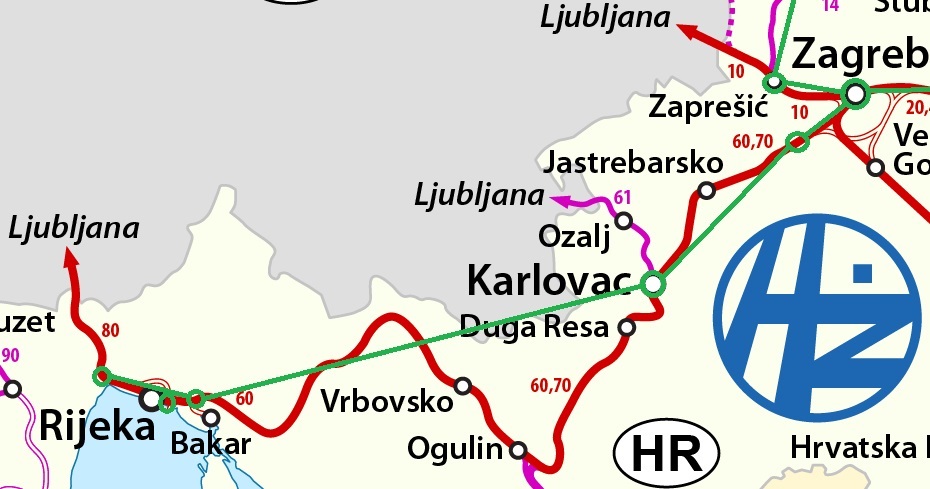
Close-Up of the Zagreb - Hrvatski Leskovac - Karlovac - Škrljevo - Rijeka - Jurdani Line | Croatian Railways
Location Permit and Plans for Škrljevo - Rijeka - Jurdani Section
A location permit has been obtained for the Škrljevo - Rijeka - Jurdani section and the main plans are being drawn, and are being co-financed by the EU with 8.5 million EUR. A final solution is currently being worked on for the Zagreb hub. According to projections, the entire Lowland Railway could be completed by 2030.
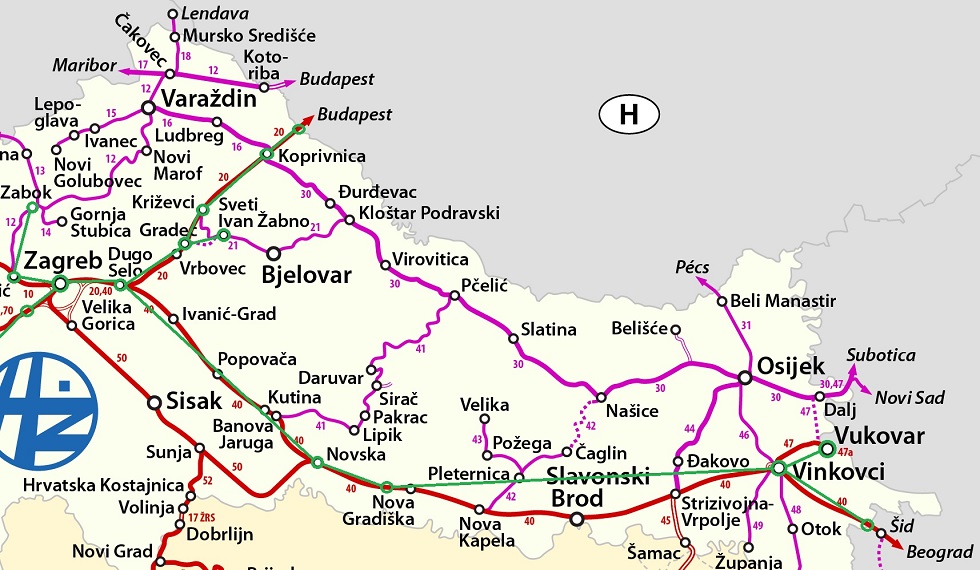
Close-Up of Railway Line Upgrades to Hungary and Serbia | Croatian Railways
Work Progressing on the Zagreb - Serbian Border Railway
Another important international route is railway from Zagreb to the border of Serbia. The sections of Vinkovci – Tovarnik – Serbian Border and Okučani – Novska have been modernized and plans reconstruction and upgrade of the Dugo Selo – Novska section are underway. The estimated price tag for work on this section is 580 million EUR. Project plans for the modernization of the Okučani - Vinkovci section are also in development.
In addition to the construction of the Dugo Selo - Križevci section, two more projects are underway. As part of the modernization and electrification of the Zaprešić - Čakovec railway, work is progressing on the Zaprešić - Zabok section.
Zagreb and Rijeka Port Hubs Undergoing Upgrades
The railway network within the greater Zagreb metropolitan area plays a crucial role in passenger transport. The value of this project, which is being carried out by the Swietelsky construction firm, is estimated at 529 million EUR, with a planned completion date of 2021.
Another important project is the reconstruction and capacity expansion of the Rijeka Brajdica freight railway station.
This project includes the complete reconstruction of the existing nine tracks and the extension of the Sušak railway tunnel to a length of 423 meters. The total value of this project is 35.6 million EUR. This project is extremely important for expanding the capacity of the Port of Rijeka.
Along with these and a few other projects in the upcoming ten years, Croatia is expected to finally upgrade its railway infrastructure. As mentioned in an earlier TCN article, these upgrades will allow train passengers to travel at speeds of 160 kilometers per hour.
Croatian Railways Project Overviews:
Here is an overview of six key railway projects; their statuses and expected dates of completion:
Dugo Selo - Križevci:
Length: 38.2 kilometers
Details: Upgrade of the existing track and construction of the second track.
Contractors: Zagreb Montaža, DIV, Dalekovod Integral
Completed: 65 percent of the financial part of the contract.
Deadline: 48 months
Cost: 196.9 million EUR
Križevci - Koprivnica - Hungarian Border:
Length: 42.6 kilometers
Details: Upgrade of the existing track and construction of the second track.
Contractors: Cengiz (Turkey)
Completed: Signing of construction contract in Spring 2020.
Deadline: 48 months
Cost: 400 million EUR
Vinkovci - Vukovar:
Length: 18.7 kilometers
Details: Track upgrade and electrification.
Contractors: Comsa
Completed: Signed construction contract.
Deadline: 24 months
Cost: 55 million EUR
Hrvatski Leskovac - Karlovac:
Length: 44 kilometers
Details: Upgrade of the existing track and construction of a second track.
Contractors: Tender in process.
Completed: EU approved co-financing with 361 million EUR.
Deadline: TBD
Cost: 450 million EUR
Zaprešić - Zabok:
Length: 23.9 kilometers
Details: Railway modernization and electrification.
Contractors: Swietelsky
Completed: In progress.
Deadline: End of 2021.
Cost: 80.8 million EUR
Rijeka Brajdica:
Length: 4 kilometers
Details: Connecting track to the container terminal of Adriatic port.
Contractors: Kolektor and Euro Asphalt
Completed: In progress.
Deadline: 45 months
Cost: 29.5 million EUR
Follow our Travel page for our continuting coverage of high-speed train track upgrades in Croatia. Train schedules, tickets, route maps and news can be accessed on the Croatian Railways site here.
Croatia President's Campaign Demanded TV Network End Debate
According to a statement released by RTL this morning, an adviser to the Kolinda Grabar-Kitarović campaign demanded that RTL end yesterday’s debate due to the Croatia President’s fatigue. However, both campaigns had already agreed in advance that they would permit the debate, which began at 20h yesterday, December 30, 2019; to last longer than 90 minutes.
In addition, both candidates publicly agreed to continue the debate when asked by RTL moderators during the broadcast, according to Vijesti/RTL on December 31, 2019. The debate, which attracted over 1 million viewers, lasted almost two and a half hours and ended around 22:30h.
RTL Releases Statement About Ending Debate
“The end of the debate was requested by Advisor to the President of the Republic, Ms. Renata Margaretić Urlić, who arrived at RTL studios with members of Croatia President’s campaign headquarters. During the debate, she entered the television control room and demanded that 'due to the prolonged duration of the debate and fatigue of the president, it must end immediately.' When asked by the debate’s editor if that was the official position of the campaign headquarters, Ms. Margaretić Urlić replied that she had 'entered on behalf of the headquarters.'"
The RTL debate moderators conveyed the request (without mentioning who it came from) to presidential candidates Kolinda Grabar-Kitarović and Zoran Milanović, but also offered them the opportunity to continue the debate, to which they both publicly agreed.
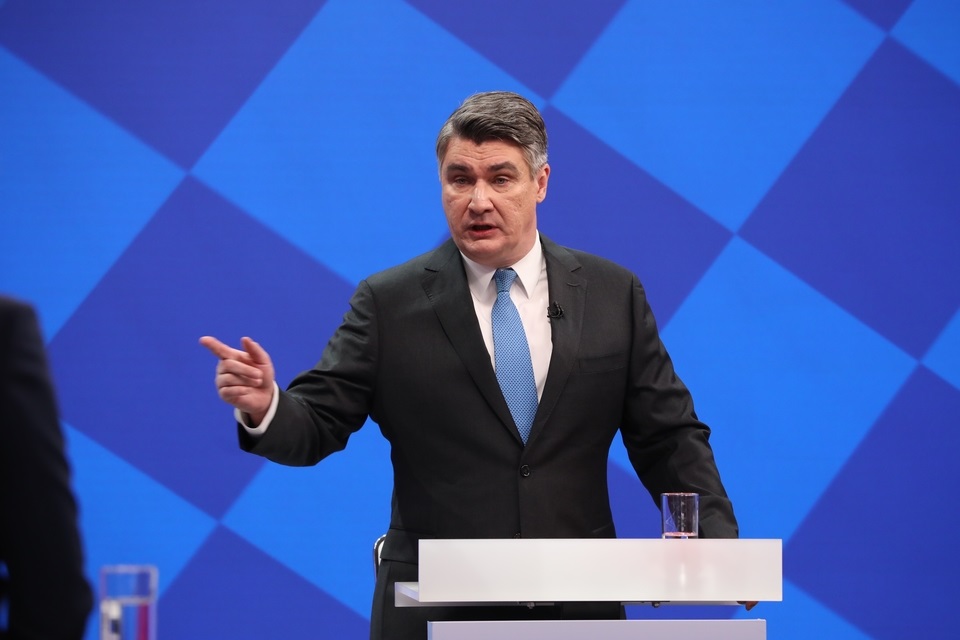
Former Croatia Prime Minister Responds
Upon learning of his opponent’s campaign demand to end the debate; Milanović wrote on Facebook:
“I came to a television debate last night with a severe cold and fever, but at no point did it occur to me to put my mild health problems ahead of the rights of our citizens to see and hear what the presidential candidates have to say. Getting tired of the debate in front of Croatian citizens whose trust you are seeking; what does that mean? If you are not able to talk for two hours about topics that are plaguing Croatia, then you are not capable of leading Croatia. Unless the reasons and motives for interrupting the debate have to do with something else…”
Indeed, the former Prime Minister appeared to have a runny nose and his sniffling was audible, if not distracting, during the entire debate.
Highlights from Monday’s Presidential Debate
Here are a few highlights from the debate according to Index on December 30, 2019:
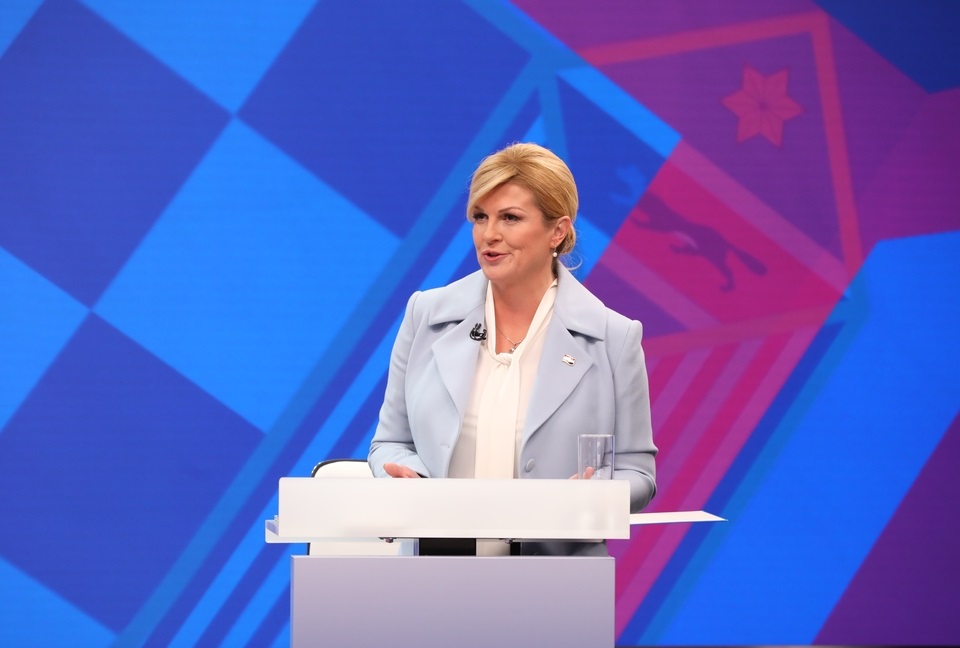
Ms. Grabar-Kitarović, why are you the best choice?
Kolinda: "What I am offering is a program. Our country was in crisis five years ago. The exodus of young people had already begun, and Croatia is in a better position today. I believe that our citizens should take those preexisting macroeconomic factors into account. Every citizen lives better now. I was the change that was needed in 2014, and now I'm looking for continuity."
Milanović got the same question: Why is he a better choice than Kolinda?
Milanović: "I have experience. I will behave in a positive predictable way. I left government while (Croatia) was in a period of growth."
Kolinda: "Croatia was devastated at the time of my arrival and the flames of pessimism were burning."
Milanović: "The year of 2015 ended with growth in the fourth quarter. Interest rates were at their lowest and there was growth in the GDP."
Kolinda: "In terms of experience, apart from experience in Croatia, I have international experience.”
Milanović then pointed out that the Sanader government, in which Kolinda had an appointed seat, still owed Croatia 135 billion HRK (18.1 billion EUR). Note: Former Prime Minister Ivo Sanader was just convicted of corruption and sentenced to 6 years in prison.
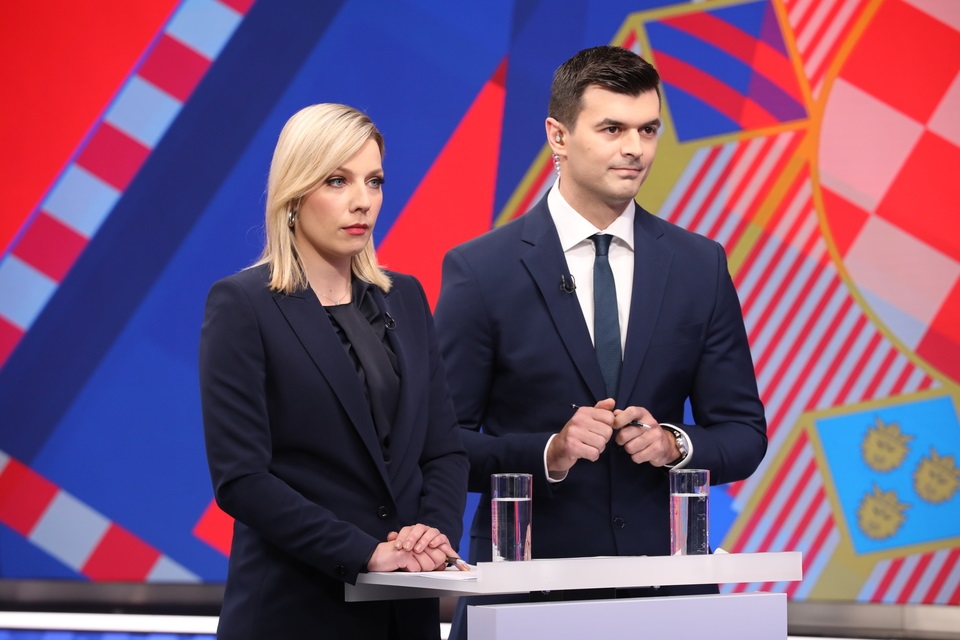
Mr. Milanović, is there anything about Kolinda’s leadership worth commending? Is there anything you would continue to do?
Milanović: "I would not continue."
Mr. Milanović, Vučić attended Kolinda's inauguration, would you have invited him?
Milanović: "I was a career diplomat. Sanader brought Kolinda on board. I did not invite Vučić to Croatia. I do not think that this should be taken out on Serbia. I would not have invited Vučić. But its necessary to work with these people (Serbian citizens). And I mean work with them, not hug them, then create diplomatic chaos and fan flames."
Kolinda: "I'm fanning flames…I said that until he fulfills his promise to find the missing (from the Homeland War), there wouldn't be another in-person meeting."
Milanović: "You were the right hand of political commissioner Ivo Sanader. Vučić create a circus here, and that's your contribution. I can talk to Vučić about missing people, but time goes on, and business goes on too. I will deal with the missing as well as business matters."
Should Croatia block Serbia on its way to the EU?
Milanović: "No. That country has the misfortune of being led by a junkyard war guy. This man is working on behalf of the Belgrade bazaar, but he is not leading the Serbian state and people. But I see a partner (in Serbia) and Croatian companies are working there."
Kolinda: "I decided to stay in Croatia, I am the daughter of a butcher who advanced in position."
Milanović: "You are from a wealthy family and a very slippery person. My father left the (Communist) party."
Kolinda: "For as much as my father had worked in Yugoslavia, he could have been a billionaire in another country."
In Bosnia, most of the voters support HDZ. How can you convince them that you are a better choice?
Milanović: "It doesn't appear that I have their support. But I don't blame them. I'm here to help. When it was necessary to give them millions in funding, we were there. We invested in a series of targeted projects, including building Catholic schools. My conscience is at ease."
Kolinda: "Congratulations. But it would be a good idea to listen to them a little more. You consider them to be second-class citizens and want to deprive them of suffrage."
Milanović: "When did I say that?"
Kolinda: "I am fighting for Bosnia and their voters. For years I have been advocating for Bosnia to enter into a concrete plan for NATO membership."
What do you think about Trump?
Kolinda: "Trump is the President of the United States, and there is currently a court process against him. I did not choose the President of the United States. The way I treat him is governed by my goal of taking care of Croatia's interests. At this stage, we are in the process of signing a double taxation treaty. We are also in the process of abolishing the visa (compulsory for Croatian citizens wishing to visit the US). Of course, I would meet with him in person."
Milanović: "I would not comment on Trump, that was not my choice."
The Euro could be introduced to Croatia in 2023. Are we prepared?
Kolinda: "I think we were ready during the first Sanader government. We moved away from that during your government."
Milanović: "Again, Sanader. A little more and the man will become a demigod. We were not members (of the EU) at the time. While you were hunting for generals (Croatian generals who were indicted by the War Crimes Tribunal and in hiding) around the world, we didn’t have any chance of entering."
Milanović: "Croatia could soon become eligible if it cuts its public debt. Look at the Czech Republic, Hungary and Poland, they are not entering the eurozone, but they could. These are older countries, and they are calculating. The claim that loans will be cheaper does not hold water. That correlation simply doesn't exist. But I'm not against it and am interested in discussing the options. These are complex topics…”
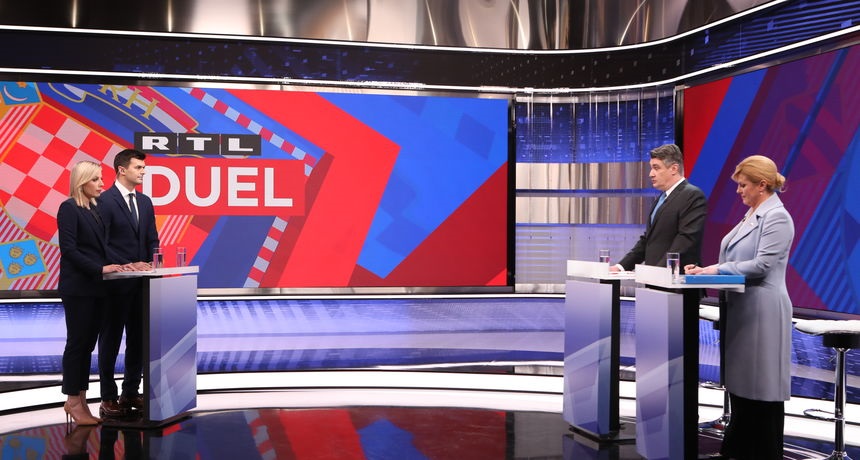
What is your relationship with (Milan) Bandić? What does he have to offer?
Kolinda: "He is the mayor of Zagreb. Everyone is innocent until proven guilty. We cannot find someone guilty and then prove that they are innocent. How many people have been imprisoned and then it turned out that they were imprisoned without cause? This is a principle I will always fight for."
Milanović: "In Croatia, fools are making a living from work, and members of the HDZ are making a living from missing evidence. I defeated him (Bandić) in SDP, and then expelled him from the party. He became your friend when he got out of detention."
Kolinda: "The presumption of innocence exists for everyone."
Milanović: "It is a disaster; this man came into my life when I defeated him in the party elections. These are friends of Ms. Kitarović. Bandić is dangerous and it's a disgrace for the city I live in. Not because he’s Herzegovinian, that’s my origin too, but it's a shady crowd."
Kolinda: "That's a man you once called your friend. I'm working with him to open kindergartens, build stadiums, deal with graffiti."
Let's say you are in Herzegovina and you run into (Zdravko) Mamić, what would you do?
Kolinda: "I would say come back to Croatia and face justice."
Milanović: "I would probably shake hands. I wouldn't say anything to him. He already knows what people think. He is a phenomenal manager, but I don't know why he became a thief."
A video of the debate can be accessed here.
Both presidential candidates will meet for two more debates before the election. On Thursday, January 2, 2020 at 20:05h they will debate on HRT. And on Friday at 20:20h they will face off on Nova TV.
Follow our Politics page for news on the upcoming presidential election in Croatia, which will take place on Sunday, January 5, 2020. We will be providing by-the-minute exit poll results and final election results after the polls close at 19h Central European Time (CET).


